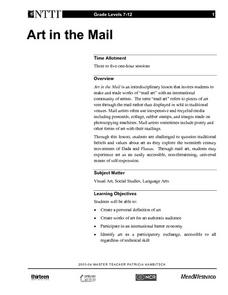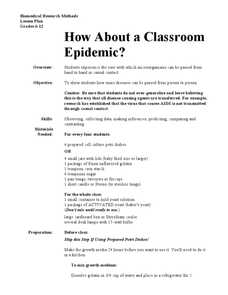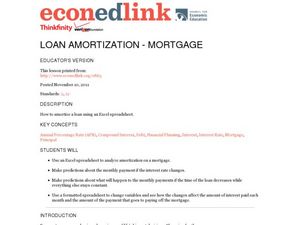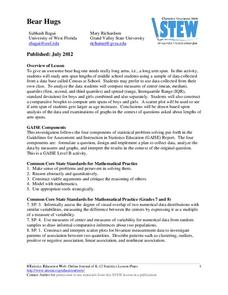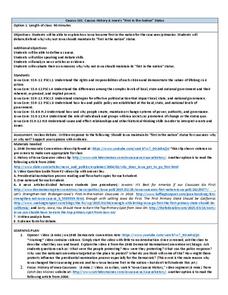Curated OER
Art in the Mail
The "mail art" phenomena was started back in the 20's with the Dada and Fluxus art movements and revitalized in the 60's. The principle of mail art, is free exchange and artistic expression. Learners study these facts and then create...
Time Warp Trio
The Seven Blunders of the World
Learners explore the cultures and civilizations of Mesopotamia. They take a look at the factors that shaped the region, and study the history of the Hanging Gardens of Babylon, and other ancient wonders of the world. The class is divided...
Curated OER
You and the Military
Do military recruiters plan to visit your campus? If so, the visit presents an opportunity for class members to engage in a series of action projects. Class members interview recruiters, propose a PTA meeting to discuss the pros and cons...
Curated OER
How About a Classroom Epidemic?
Have individuals wash their hands with soap and water, give one of them a yeast-covered piece of candy, and then have him shake hands with the person next to him. Handshakes continue down the line until everyone in the class has had...
Curated OER
Cold War Conflict in Vietnam: The Vietnam-Era Presidency
Comparing and evaluating various media types is a great way to build critical analysis skills. Learners read about the Vietnam era presidency, specifically the foreign policy established by Johnson and Nixon. Then they compare several...
Curated OER
Animals Project for German Students
Who doesn't love animals? Young learners will be excited to develop their vocabulary and categorize animals into different lists. This includes a fun extension activity that encourages the older learners to create a PowerPoint...
Curated OER
Loan Amortization - Mortgage
Upper graders explore the connection between interest and principal. They use an amortization schedule to determine the amount of principal paid vs interest on a $100,000 home loan. Fourteen discussion questions and a research-based...
Curated OER
"Whose (Is)land is This?": topics in Immigration and The Tempest
Class members compare the ways the subject of immigration is treated in The Tempest, Act I, scene ii, Act II, scene i and Act III, scene ii with patterns in American history. After tracing their own family’s journey, a series of...
Curated OER
KWHL Questioning Strategy for Briar Rose
Whether new to the KWHL strategy or not readers of Briar Rose will benefit from the detailed procedures and templates designed for Jane Yolen’s novel. Links are provided for research into the Holocaust and activities reveal the many...
American Statistical Association
Bear Hugs
Scholars research arm span to determine who gives the best bear hugs. They use data from a national study to find the standard statistics for arm span. It includes mean, median, quartiles, spread, standard deviation, and more.
University of Chicago
Using Artifacts for Clues About Identity
Learn about the ancient Near East through a close examination of ancient artifacts. Lead your class into analysis by first observing an artifact as a class. Pupils can then work in pairs to analyze the other artifacts and compile a list...
EngageNY
Main Ideas in Informational Text: Analyzing a Firsthand Human Rights Account for Connections to Specific Articles of the UDHR
Lesson 10 in a series of human rights lessons focuses on the skills of finding evidence and summarizing. Your young readers work to compare the two texts they have read in this unit: the Universal Declaration of Human Rights...
Speak Truth to Power
Harry Wu: Forced Labor
Over the course of two class periods, young historians explore human rights issues; specifically, forced labor in China. This resource provides everything you need, including relevant vocabulary, an anticipatory activity, and a...
Curated OER
Bill of Rights
US history classes explore constitutional rights as they relate to court cases involving teens. Your class must already be familiar with the Bill of Rights before beginning this series of exercises. In preparation for a debate-style...
Warren County Public Schools
Small Group Discussion Questions
Support a class reading of the novel Song of the Trees by Mildred D. Taylor with this series of discussion questions. Covering a variety of topics from character and setting to historical accuracy and symbolism, these questions challenge...
Carfleo
Substance Use and Abuse
What is substance abuse? What is the difference between a depressant and a stimulant? Here is a comprehensive unit on drug use, including three lessons with such activities as categorizing and defining key terms, identifying issues...
Achieve3000
Oral Reading Fluency
Accuracy, phrasing, flow, and pace, the four traits of of oral reading fluency, are the focus of a series of exercises that are designed to help readers develop these comprehension and literacy skills.
Maryland Department of Education
The Concept of Diversity in World Literature Lesson 4: Proverbs
"Eneke the bird says since men have learnt to shoot without missing, he has learnt to fly without perching." As part of their study of Things Fall Apart, class members read Paul Hernadi and Francis Steen's essay, "The Tropical Landscapes...
ESL Holiday Lessons
Mardi Gras
Take a trip to Mardi Gras with a festive reading packet! After class members read an informational article about the history and celebration of Mardi Gras, they think about the structure of the passage by unscrambling words, filling in...
Caucus 101
Caucus History and Iowa’s “First in the Nation” Status
What is a caucus? Why is Iowa's first? Why did Iowa shift to the caucus format? After researching these basic questions, class members debate the question of whether or not Iowa should maintain its "first in the nation" status for caucuses.
Classroom Law Project
What is a class hearing and youth summit and what do they have to do with the presidential election?
After researching the presidential election process, class members develop questions and interview voters about their choice of candidate and the issues that concern them.
University of Connecticut
Building Your Own Biosphere
On September 26, 1991, four women and four men entered the scientific experiment, Biosphere 2; the doors were sealed for two years in order to study the interactions of a biosphere. In the activity, scholars explore biospheres by...
Center for History and New Media
Growing Up in a Segregated Society, 1880s–1930s
What did segregation look like in the beginning of the 20th century? Middle and high schoolers view images of segregated areas, read passages by Booker T. Washington and W.E.B. DuBois, and come to conclusions about how the influence of...
Howard Hughes Medical Institute
Building Ecological Pyramids
Looking for a fresh take on traditional food/energy pyramids? Conduct an innovative activity where pupils build their own! The lesson uses research data from Gorongosa National Park in Mozambique for a real-life safari touch. Scholars...
Other popular searches
- Internet Research Skills
- Library Research Study Skills
- Teaching Research Skills
- Basic Research Skills
- Teach Research Skills
- Research Skills Atlas
- Library Research Skills
- Practice Research Skills
- History Research Skills
- Assessing Research Skills
- Literacy Research Skills
- Reach Research Skills


